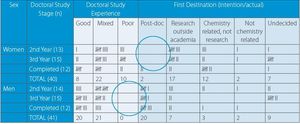 A report from the UK warns about the declining appeal of academic careers for female scientists. In focus groups and telephone interviews with chemistry doctoral students, the authors found that female scientists are less likely than their male counterparts to pursue a career in academic research.
A report from the UK warns about the declining appeal of academic careers for female scientists. In focus groups and telephone interviews with chemistry doctoral students, the authors found that female scientists are less likely than their male counterparts to pursue a career in academic research.
What’s particularly troubling is that women at the beginning of their studies are more likely than men to declare an interest in pursuing academic careers. By their third year of the PhD, the proportion of men keen on the academic track barely budges, but the percentage of women plummets by half.
The main reasons for this drop-off:
- The constant search for funds in academic science is unappealing.
- The uncertainty of securing a stable, long-term position turns off women.
- The personal sacrifices do not outweigh the rewards.
As dispiriting as the conclusions are, it is even more grim that by the third year, 21% of men and 12% of women view academia as their preferred career path. So, while women may be disproportionately soured on academic research, many men also find it an unattractive career.